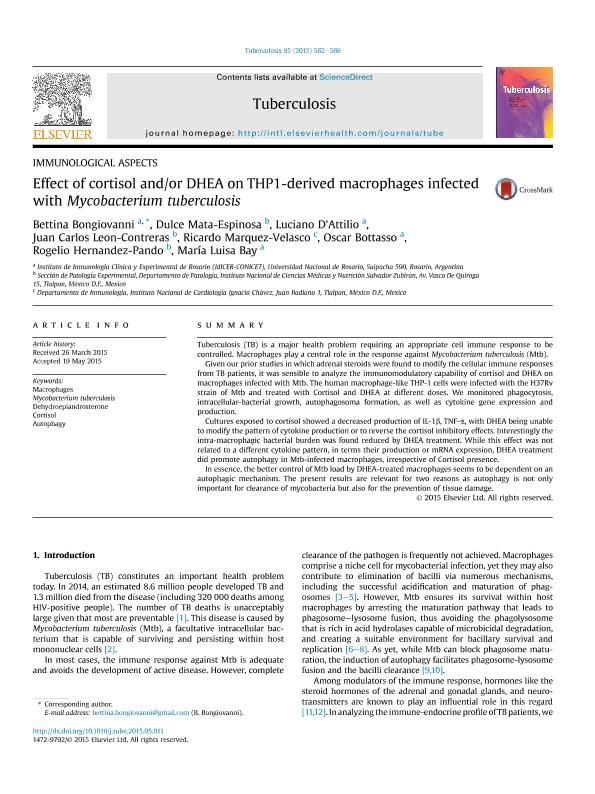Artículo
Effect of cortisol and/or DHEA on THP1-derived macrophages infected with Mycobacterium tuberculosis
Bongiovanni, Bettina ; Mata Espinosa, Dulce; D'attilio, Luciano David
; Mata Espinosa, Dulce; D'attilio, Luciano David ; Leon Contreras, Juan Carlos; Marquez Velasco, Ricardo; Bottasso, Oscar Adelmo
; Leon Contreras, Juan Carlos; Marquez Velasco, Ricardo; Bottasso, Oscar Adelmo ; Hernandez Pando, Rogelio; Bay, Maria Luisa
; Hernandez Pando, Rogelio; Bay, Maria Luisa
 ; Mata Espinosa, Dulce; D'attilio, Luciano David
; Mata Espinosa, Dulce; D'attilio, Luciano David ; Leon Contreras, Juan Carlos; Marquez Velasco, Ricardo; Bottasso, Oscar Adelmo
; Leon Contreras, Juan Carlos; Marquez Velasco, Ricardo; Bottasso, Oscar Adelmo ; Hernandez Pando, Rogelio; Bay, Maria Luisa
; Hernandez Pando, Rogelio; Bay, Maria Luisa
Fecha de publicación:
09/2015
Editorial:
Elsevier
Revista:
Tuberculosis (edinb)
ISSN:
1472-9792
Idioma:
Inglés
Tipo de recurso:
Artículo publicado
Clasificación temática:
Resumen
Tuberculosis (TB) is a major health problem requiring an appropriate cell immune response to be controlled. Macrophages play a central role in the response against Mycobacterium tuberculosis (Mtb).
Given our prior studies in which adrenal steroids were found to modify the cellular immune responses from TB patients, it was sensible to analyze the immunomodulatory capability of cortisol and DHEA on macrophages infected with Mtb. The human macrophage-like THP-1 cells were infected with the H37Rv strain of Mtb and treated with Cortisol and DHEA at different doses. We monitored phagocytosis, intracellular-bacterial growth, autophagosoma formation, as well as cytokine gene expression and production.
Cultures exposed to cortisol showed a decreased production of IL-1β, TNF-α, with DHEA being unable to modify the pattern of cytokine production or to reverse the cortisol inhibitory effects. Interestingly the intra-macrophagic bacterial burden was found reduced by DHEA treatment. While this effect was not related to a different cytokine pattern, in terms their production or mRNA expression, DHEA treatment did promote autophagy in Mtb-infected macrophages, irrespective of Cortisol presence.
In essence, the better control of Mtb load by DHEA-treated macrophages seems to be dependent on an autophagic mechanism. The present results are relevant for two reasons as autophagy is not only important for clearance of mycobacteria but also for the prevention of tissue damage.
Archivos asociados
Licencia
Identificadores
Colecciones
Articulos(CCT - ROSARIO)
Articulos de CTRO.CIENTIFICO TECNOL.CONICET - ROSARIO
Articulos de CTRO.CIENTIFICO TECNOL.CONICET - ROSARIO
Articulos(IDICER)
Articulos de INSTITUTO DE INMUNOLOGIA CLINICA Y EXPERIMENTAL DE ROSARIO
Articulos de INSTITUTO DE INMUNOLOGIA CLINICA Y EXPERIMENTAL DE ROSARIO
Citación
Bongiovanni, Bettina; Mata Espinosa, Dulce; D'attilio, Luciano David; Leon Contreras, Juan Carlos; Marquez Velasco, Ricardo; et al.; Effect of cortisol and/or DHEA on THP1-derived macrophages infected with Mycobacterium tuberculosis; Elsevier; Tuberculosis (edinb); 95; 5; 9-2015; 562-569
Compartir
Altmétricas



